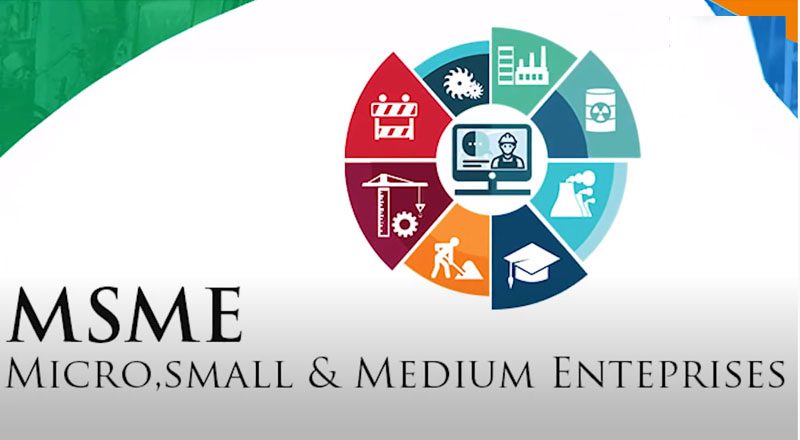Micro, Small & Medium Enterprises (MSME) Day 2024: Insights from India’s Top Leaders on How the 45-Day MSME Payment Rule Will Be a Game-Changer for MSMEs

Micro, Small & Medium Enterprises (MSME) Day is celebrated globally on June 27th to recognize the importance of MSMEs in fostering innovation, creativity, and sustainable development. In India, the MSME sector is a vital part of the economy, contributing significantly to employment, GDP, and exports.
In 2024, a notable development is the implementation of the 45-day MSME payment rule, which mandates that payments to MSMEs must be settled within 45 days.
The 45-Day MSME payment rule is a critical regulatory framework aimed at bolstering the financial health of Micro, Small, and Medium Enterprises (MSMEs). This rule mandates that all buyers, including large corporations and government agencies, must settle their invoices with MSMEs within 45 days of the goods or services being delivered. This legislation, established under the Micro, Small and Medium Enterprises Development (MSMED) Act, 2006, is designed to address the chronic issue of delayed payments, which has long plagued MSMEs, hampering their growth and operational efficiency.
One of the primary benefits of this rule is the enhancement of liquidity for MSMEs. Timely payments ensure that MSMEs have a steady cash flow, which is crucial for their day-to-day operations. Liquidity is vital for covering expenses such as salaries, raw materials, utilities, and other operational costs. Without sufficient cash flow, MSMEs often struggle to meet these obligations, leading to disruptions in their business activities. The assurance of receiving payments within 45 days provides these enterprises with a more predictable and reliable financial outlook, enabling them to plan and execute their business strategies more effectively.
Moreover, the 45-Day MSME payment rule reduces the dependency of MSMEs on external financing. Traditionally, MSMEs have had to resort to borrowing from financial institutions or informal lenders to bridge the gap caused by delayed payments. This borrowing often comes at high-interest rates, further straining their financial resources. By ensuring timely payments, MSMEs can reduce their reliance on such expensive credit options, thereby saving on interest costs and improving their overall profitability. This financial stability can also enhance their creditworthiness, making it easier and cheaper to access financing when genuinely needed.
In addition, this payment rule fosters a healthier business ecosystem by promoting ethical business practices. Large corporations and government bodies are compelled to honor their financial commitments promptly, thereby cultivating a culture of timely payments. This can lead to improved business relationships and trust between MSMEs and their clients. When payments are made on time, it also enhances the reputation of the larger corporations and government entities, as they are seen as reliable and trustworthy partners. This mutual respect and trust can result in more robust and sustained business partnerships.
Furthermore, the implementation of the 45-Day MSME payment rule can stimulate economic growth. MSMEs are significant contributors to employment and GDP in many countries. By ensuring their financial stability, the rule helps these enterprises to expand, innovate, and create more job opportunities. A financially healthy MSME sector can drive economic diversification and resilience, contributing to the overall economic development of a nation.
The rule also provides a legal recourse for MSMEs in case of non-compliance by buyers. Under the MSMED Act, MSMEs can seek interest on delayed payments, which acts as a deterrent against payment delays. This legal backing empowers MSMEs to assert their rights and ensures that buyers adhere to the payment timelines.
In this story, we spoke to experts in the field to get their insights on how this rule will impact MSMEs:-
Mr. Amit Patjoshi, CEO, Palladium India
 The introduction of the 45-day payment rule for MSMEs into Section 43b(h) of the Income Tax Act is envisaged to be a game-changer for India’s business landscape. This section disallows large businesses from claiming deductions for expenses incurred towards goods or services purchased from MSMEs if the payment is delayed beyond a specific timeframe. Additionally, corporations will have to pay interest at three times the prevailing bank rates for such delays. This rule would resolve the ever-teething issues of working capital that MSMEs face due to delayed payments. Timely payments are viewed positively by many financial institutions as a sign of a stable business, leading to easier access to finance and better credit terms, along with promoting a healthier and fairer business ecosystem. This rule is one of the most critical and needed interventions for the sector, and there is definitely a positive buzz among MSMEs for this much-needed intervention.
The introduction of the 45-day payment rule for MSMEs into Section 43b(h) of the Income Tax Act is envisaged to be a game-changer for India’s business landscape. This section disallows large businesses from claiming deductions for expenses incurred towards goods or services purchased from MSMEs if the payment is delayed beyond a specific timeframe. Additionally, corporations will have to pay interest at three times the prevailing bank rates for such delays. This rule would resolve the ever-teething issues of working capital that MSMEs face due to delayed payments. Timely payments are viewed positively by many financial institutions as a sign of a stable business, leading to easier access to finance and better credit terms, along with promoting a healthier and fairer business ecosystem. This rule is one of the most critical and needed interventions for the sector, and there is definitely a positive buzz among MSMEs for this much-needed intervention.
However, market forces have given us a different perspective on this well thought out rule. There is a fear that to circumvent this rule, large corporations would reduce their orders from MSMEs and instead procure from unregistered entities. In my recent interactions with MSMEs and MSME Associations in Maharashtra, many highlighted that traders and exporters will have to pay their MSME sellers on time, even when they do not receive the money from their buyers within the same timeframe, leading to significant cash flow issues. In many cases, MSMEs are reluctant to file claims as it will affect their long-term relations and are working with larger buyers to raise delayed invoices or, in extreme cases, modify their MSME registration status
To address these bottlenecks, the government could consider implementing a 45-day or a 90-day rule, which might be more in alignment with the current credit cycle in the sector. They could impose an initial interest rate on delayed payments at the prevailing bank rate, with subsequent step increases as the delay lengthens or for multiple defaults and incentivize large companies who adhere to the MSME 45/90 days rule. If the government decides not to implement the rule at all, they may consider other innovative solutions to reduce the working capital burden of MSMEs, such as mainstreaming bill discounting for MSMEs, providing low-interest working capital loans to MSMEs whose goods have been accepted and payment is pending, and improving resources behind important institutional machinery like MSME Samadhaan to ensure timely resolution of cases without enforcement of any rule, among other measures.
We are confident the government will make the right decisions to ensure that the needs of all stakeholders are addressed.
Mr. Mandeep Arora, Co-founder, VingaJoy

The 45-day payment rule is part of a broader initiative to create a more favorable business environment for MSMEs. He mentioned that ensuring timely payments will help build trust between MSMEs and larger corporations, fostering a more collaborative ecosystem. Goyal also noted that this move aligns with the government’s vision of making India a $5 trillion economy, where MSMEs play a crucial role.
Mr. Lalit arora, Co-Founder, UBON

The 45-day payment rule, mandating that payments to Micro, Small, and Medium Enterprises (MSMEs) be made within 45 days, holds significant potential to drive innovation and competitiveness within the sector. Ensuring timely payments addresses one of the critical challenges MSMEs face: cash flow management. With a steady and predictable cash flow, MSMEs can allocate resources more effectively, allowing them to focus on innovation, product quality, and market expansion.
Innovation is often resource-intensive, requiring investment in research and development, new technologies, and skilled personnel. Assured cash flow enables MSMEs to invest in these areas without the constant concern of delayed payments disrupting their financial stability. This can lead to the development of new products, improvements in existing offerings, and adoption of more efficient production processes, ultimately enhancing the competitiveness of these enterprises.





